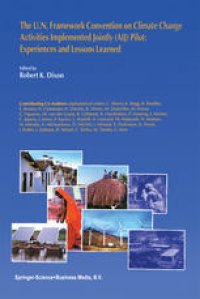
Ebook: The U.N. Framework Convention on Climate Change Activities Implemented Jointly (AIJ) Pilot: Experiences and Lessons Learned
- Tags: Climate Change, Meteorology/Climatology, Environmental Management, Social Sciences general, Economics general
- Series: Institute for Global Environmental Strategies 1
- Year: 1999
- Publisher: Springer Netherlands
- Edition: 1
- Language: English
- pdf
Jose Maria Figueres Olsen Former President Republic of Costa Rica The heated debate about global climate change continues. Some say it is the gravest calamity our species has ever encountered. Others deny its existence altogether. As with most caseS of human decision making, the truth is most likely somewhere in the middle. The challenge of this particular set of decisions is the overwhelming sense of uncertainty. Science cannot fully attribute the climatic catastrophes occurring before our eyes to increasing levels of greenhouse gas concentrations. Neither can Science prove that extreme events and warming trends are unrelated to human behavior. Economic models, sophisticated as they are, cannot agree on the costs of reducing carbon dioxide (C~) emissions in industrialized countries. International negotiations are thus mired in the morass of scientific and economic uncertainty. The are only two elements of certainty in the whole debate. The frrst is the need for precaution. The potential impacts are such, that the risk of inaction is unaffordable to the human race. Under the current state of knowledge, mankind must take cautious but unequivocal steps to reverse current patterns.
This book is the first comprehensive, in-depth review and summary of the U.N. FCCC AIJ pilot. Over 30 prominent players in the U.N. FCCC AIJ pilot, drawn from 12 countries, prepared the 16 peer-reviewed chapters in this book. Most chapters are extensively illustrated and the book contains a glossary of acronyms and a list of points of contact in the U.N. FCCC AIJ pilot. To help meet the technical and policy needs associated with the U.N. FCCC and complementary treaty negotiations, this book has three broad objectives: review, interpret and compile experiences of AIJ pilot participants and observers; based on empirical data and skilled observations, identify and document lessons learned from the AIJ pilot; and, interpret, summarize and translate lessons learned for future consideration by FCCC parties.
Specific topics covered in this book include an introduction to the AIJ pilot and the FCCC guidelines/criteria, AIJ project development and finance, the project development community, an overview of energy and land-use and forestry sector projects, sustainable development, technology transfer, human and institutional capacity building, legal issues, and project monitoring, verification and reporting. This volume will be of interest to the generalists familiar with FCCC issues and negotiations but explores most topics in sufficient technical and policy depth to be must reading for policy analysts, diplomats, environmental protection specialists, scientists, engineers, project developers, attorneys, economists, development workers, foresters, and energy specialists.